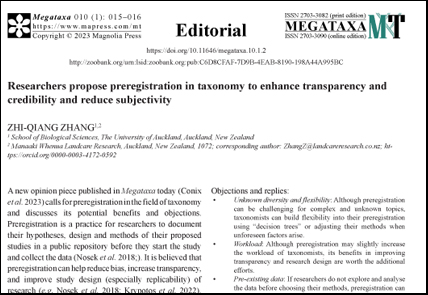Abstract
A new opinion piece published in Megataxa today (Conix et al. 2023) calls for preregistration in the field of taxonomy and discusses its potential benefits and objections. Preregistration is a practice for researchers to document their hypotheses, design and methods of their proposed studies in a public repository before they start the study and collect the data (Nosek et al. 2018). It is believed that preregistration can help reduce bias, increase transparency, and improve study design (especially replicability) of research (e.g. Nosek et al. 2018; Krypotos et al. 2022), including exploratory research such as some aspects of biodiversity discovery and taxonomy (Dirnagl et al. 2020). While preregistration has been already employed in other fields such as social sciences (e.g. Camerer et al. 2016, 2018) and ecology/evolution (e.g. Kelly 2019), it has yet been adopted in taxonomy. Conix et al. (2023) argue that preregistration could be beneficial for taxonomy, given the challenges it faces, such as subjectivity, disagreement, and credibility:
References
Camerer, C.F., Dreber, A., Forsell, E., Ho, T.-H., Huber, J., Johannesson, M., Kirchler, M., Almenberg, J., Altmejd, A., Chan, T., Heikensten, E., Holzmeister, F., Imai, T., Isaksson, S., Nave, G., Pfeiffer, T., Razen, M. & Wu, H. (2016) Evaluating replicability of laboratory experiments in economics. Science, 351, 1433–1436. https://doi.org/10.1126/science.aaf0918
Camerer, C.F., Dreber, A., Holzmeister, F., Ho, T.-H., Huber, J., Johannesson, M., Kirchler, M., Nave, G., Nosek, B.A., Pfeiffer, T., Altmejd, A., Buttrick, N., Chan, T., Chen, Y., Forsell, E., Gampa, A., Heikensten, E., Hummer, L., Imai, T., Isaksson, S., Manfredi, D., Rose, J., Wagenmakers, E.-J. & Wu, H. (2018) Evaluating the replicability of social science experiments in Nature and Science between 2010 and 2015. Nature Human Behaviour, 2, 637–644. https://doi.org/10.1038/s41562-018-0399-z
Conix, S., Cuypers, V., Zachos, F.E., Artois, T. & Monnens, M. (2023) A plea for preregistration in taxonomy. Megataxa, 10 (1), 1–14. https://doi.org/10.11646/megataxa.10.1.1
Dirnagl, U. (2020) Preregistration of exploratory research: Learning from the golden age of discovery. PLOS Biology, 18, e3000690. https://doi.org/10.1371/journal.pbio.3000690
Kelly, C.D. (2019) Rate and success of study replication in ecology and evolution. PeerJ, 7, e7654. https://doi.org/10.7717/peerj.7654
Krypotos, AM., Mertens, G., Klugkist, I. & Engelhard, I.M. (2022) Preregistration: Definition, advantages, disadvantages, and how It can help against Questionable Research Practices. In: O'Donohue, W., Masuda, A. & Lilienfeld, S. (eds) Avoiding Questionable Research Practices in Applied Psychology. Springer, Cham, pp 343–357. https://doi.org/10.1007/978-3-031-04968-2_15
Nosek, B.A., Ebersole, C.R., DeHaven, A.C. & Mellor, D.T. (2018) The preregistration revolution. Proceedings of the National Academy of Sciences of the United States of America, 115, 2600–2606. https://doi.org/10.1073/pnas.1708274114
Pham, M.T. & Oh, T.T. (2021) Preregistration is neither sufficient nor necessary for good science. Journal of Consumer Psychology, 31, 163–176. https://doi.org/10.1002/jcpy.1209

